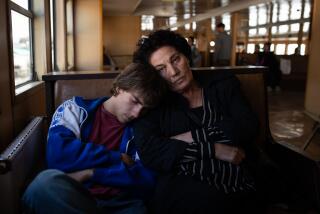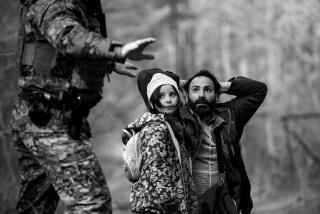Review: Valeska Grisebach’s ‘Western’ is a broodingly intelligent drama of culture clash
Like its title, “Western” is both startlingly direct and full of resonance and ambiguity. Written and directed by the gifted Valeska Grisebach, the movie follows a group of German construction workers into a remote stretch of Bulgarian countryside, near the Greek border, where they have come to build a hydroelectric power plant. The story is a faultlessly observed, broodingly intelligent piece of realism, a dispatch from a sun-baked frontier that could hardly feel more mundane or specific, but which Grisebach somehow suffuses with the beauty and power of myth.
We are a long way from Monument Valley, but the images in “Western,” shot by the cinematographer Bernhard Keller, have a rough-hewn majesty that cuts across genre and geography. You can sense Grisebach’s stealth homage to the work of Hollywood masters like John Ford and Anthony Mann in her feel for magnificent, rugged landscapes, which also includes the craggily handsome face of her leading man, Meinhard Neumann.
Like the other members of the ensemble, Neumann is a first-time actor giving authentic shape to an utterly plausible situation. He plays Meinhard, a German ex-Legionnaire who has come to Bulgaria to make some money and perhaps purge a few painful memories. Directing the viewer’s attention at times with little more than a disapproving stare, Meinhard guides us through what looks at first like a straightforward study of clashing cultures and homosocial group dynamics.
In temperament and life experience, he stands apart from his fellow laborers, most of whom are younger and more unruly. The group’s arrogant boss, Vincent (Reinhardt Wetrek), gets off on the wrong foot with the locals when he harasses a young Bulgarian woman (Viara Borisova) swimming in a river near their camp.
In another scene, he marks the construction site with a German flag, which is promptly stolen. His justification for his men’s presence on foreign soil — “We’re bringing infrastructure” — is more of an excuse for his own boorishness.
Meinhard, by contrast, has a gift for defusing ugly situations, which suggests he’s seen his fair share of them. For reasons he has little interest in explaining — perhaps to compensate for his colleagues’ misbehavior, but also perhaps out of natural curiosity — he begins hanging out with the villagers.
He forges an especially close bond with a landowner, Adrian (Syuleyman Alilov Letifov), and even borrows the latter’s beautiful white horse, adding another layer of western imagery even as it pushes the story in a harrowing, unsettling direction.
“Western” is Grisebach’s third feature, and it marks a long-overdue return to the big screen after her internationally acclaimed 2006 film, “Longing.” In between, the director served as a script consultant on the masterful 2016 comedy “Toni Erdmann,” whose director, Maren Ade, is credited as a producer here. The kinship between the two pictures is unmistakable: Beyond their shared interest in cultural dislocation and 21st-century global economic imperatives, both unfold over a long arc that can seem meandering in the moment but reveals its tight, intricate structure in retrospect.
The animus between locals and outsiders occasionally surfaces in dialogue, and more than one character alludes, with bitter irony, to the German occupation of Bulgaria during World War II. But for the most part the menace simmers just beneath the surface, and Grisebach shows a remarkable talent for drawing out and modulating tension within a scene. She is clearly fascinated by the interplay of hostilities here, by the ways in which individual resentments can intersect with a broader, cultural and historical sense of indignation.
But the understated achievement of “Western” is that it never feels like it’s illustrating a thesis about the brutality of man or the inevitability of bloodshed. Rather than surveying her nonprofessional actors with a detached, analytical eye, Grisebach shoots them in a style both observant and intimate.
Even when a group conversation is taking place, she tends to isolate speakers and listeners in the frame, a technique that involves us even as it teases our peripheral vision. (The frequent nighttime shots demand similarly close attention.) And while certain characters have a built-in iconic stature — Meinhard’s strong, silent type, Vincent’s callow brute — the director confounds our temptation to think we’ve got them figured out.
“Violence is not my thing,” Meinhard says, and it isn’t really this movie’s, either. Even as “Western” channels the themes and mechanics of its eponymous genre, it resists every inclination to lead the viewer down a familiar path. If conflict is inevitable, the movie suggests, then perhaps friendship is at least possible. In one of the most gently touching scenes, Meinhard and Adrian bond so readily, you might momentarily forget that they aren’t speaking the same language.
------------
‘Western’
Not rated
In Bulgarian, German and English dialogue with English subtitles
Running time: 2 hours
Playing: Laemmle’s Music Hall 3, Beverly Hills
See the most-read stories in Entertainment this hour »
Movie Trailers
More to Read
Only good movies
Get the Indie Focus newsletter, Mark Olsen's weekly guide to the world of cinema.
You may occasionally receive promotional content from the Los Angeles Times.











